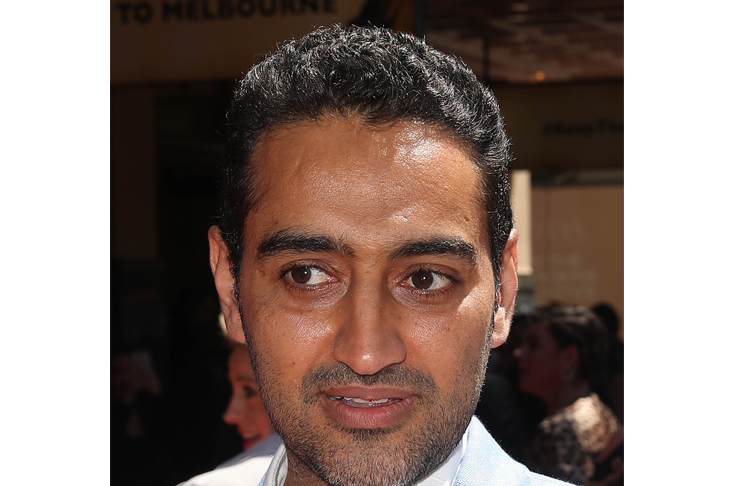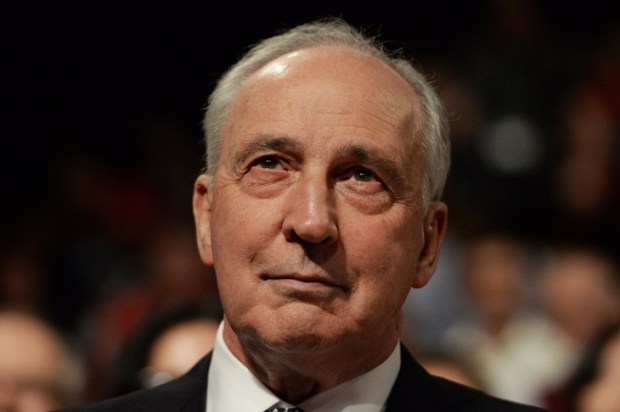In 2009, on ABC’s Q&A, host Tony Jones asked host of Channel Ten’s The Project and practising Muslim Waleed Aly if homosexuality is a sin in Islam. Mr Aly replied, ‘I’ll get to that,’ digressing for two hundred words until author and atheist Christopher Hitchens interrupted, to point out that Mr Aly was ‘dodging’ the question. Mr Aly continued to dodge for another two hundred words and, as best as one can tell, is still dodging it to this day.
This week on Channel Ten’s The Sunday Project host Lisa Wilkinson didn’t ask Mr Aly, or any other Muslims, whether homosexuals go to hell. The spotlight was on the managing director of the Australian Christian Lobby, Martyn Iles, who was defending star rugby player, Israel Folau. Mr Iles was more direct than Mr Aly, which is hardly surprising; the Islamic view of homosexuality would not be easy to defend to a Q&A audience. Under sharia law, homosexuality is a crime in eighty countries and carries the death penalty in seven. The mainstream Christian belief is fundamentally different. ‘All of us are born going to hell,’ Mr Iles explained, adding that Mr Folau’s controversial post did not target homosexuals. Why? Because for Christians, all sex outside of the sacrament of marriage is sinful, whether fornication, adultery or sodomy, and even those who have no sex at all are born sinners. All of this can only be forgiven by the grace of the Almighty.
It didn’t satisfy co-host Hamish Macdonald, who came out as gay earlier this month. A simple ‘Yes, Hamish, you and your partner are going straight to hell for being gay,’ would have been so much easier to demonise than a message of love and redemption for all who follow in the path of the Lord.
The debate around the sacking of Israel Folau has exposed not just widespread ignorance about the beliefs of Christians, the largest religious group in the world, whose 2.3 billion adherents make up nearly one third of the Earth’s population, but also about human rights.
In 1948, Australia voted in favour of the Universal Declaration of Human Rights, which states that everyone has the right to freedom of religion and that this right is inalienable, meaning it cannot be revoked by an outside force. Similarly, in 1966, Australia voted in favour of the International Covenant on Civil and Political Rights, which guarantees the right to manifest one’s religious beliefs in worship, observance, practice and teaching, alone or with others, in private or public and without being subjected to coercion which would impair that freedom.
One would have thought that threatening to sack a person if they didn’t renounce tenets of their faith would amount to some sort of coercion in anyone’s book. Equally, one might have expected the social justice warriors who have launched their unholy crusade against Mr Folau to be the first to denounce the violation of his UN-sanctioned rights. That they haven’t is because of the tension between freedom of religion and anti-discrimination laws, yet few seem prepared to concede even that.
On Fox Sports this week, 2001 Super Rugby champion Justin Harrison said he was ‘very tired of reading about Izzy Folau spruiking that this is a defence of Catholicism (Mr Folau is an evangelical Christian) and free speech. It’s absolutely nothing to do with that, it’s about breaching an employment contract,’ he claimed, seemingly unable to grasp that it was because Mr Folau expressed his religious beliefs that he was deemed to have breached his contract by bringing the sport of rugby into disrepute.
Thomas Arnold, the headmaster of Rugby School and father of the sport would be astonished — not least because Mr Folau, appears to be the epitome of ‘Muscular Christianity,’ the philosophy of ‘developing leaders with moral integrity and grit while also being physically strong,’ which Mr Arnold saw as the chief value of the game.
All this seems to be lost on Rugby Australia and its supporters. Former Wallabies and Waratah teammate Drew Mitchell was ‘outraged’ merely because Mr Folau had created a GoFundMe page to raise money to pay for his legal costs rather than selling his assets to pay for his legal battle, challenging his dismissal by Rugby Australia. ‘How are we still talking about this?’ Mr Mitchell asked, forlornly, lamenting the damage it was doing to the game, rather than the damage it was doing to his former colleague.
His view is that Mr Folau ‘chose’ to bring these troubles on himself, not that Rugby Australia ‘chose’ to bring these troubles on the players. Indeed, even though Mr Folau has sacrificed a multimillion-dollar contract rather than renounce his faith, Mr Mitchell questioned his sincerity saying, ‘If he really believed in what he’s doing, he could sell (his assets) and go and fund it himself.’ ‘One asset he doesn’t have is a brain,’ interjected Mr Harrison smirking. ‘Why he is doing it I have no idea,’ said 2014 Super Rugby Champion Stephen Hoiles, which summed up the position of most of the sporting fraternity.
It is not just the sports industry that has turned on Mr Folau. GoFundMe decided that that he should not even be allowed to raise funds on their platform, shutting down his campaign which had raised almost $700,000 from 9,000 donations. Ironically, they claimed this was because ‘they do not tolerate the promotion of discrimination or exclusion,’ although the exclusion of devout evangelical Christians, is not, it seems, a problem.
Not content simply to see Mr Folau punished, former national netball captain Liz Ellis expressed her disgust at her sports peak body for not sanctioning his wife, a netball star, simply for supporting her husband. ‘Yeah nah not good enough,’ Ms Ellis wrote. ‘Anyone who is seen to support or endorse homophobia is not welcome.’
The allies of the LGBTIQ+ community feel supremely comfortable in denouncing Christian ‘homophobia’ even though the religion explicitly instructs its followers to love all sinners and to eschew violence, but at the same time they are remarkably quiet about Islam.
Judging by past performance however, it seems unlikely that Mr Aly and his co-hosts at The Project will get to that anytime soon.
Got something to add? Join the discussion and comment below.
Get 10 issues for just $10
Subscribe to The Spectator Australia today for the next 10 magazine issues, plus full online access, for just $10.
You might disagree with half of it, but you’ll enjoy reading all of it. Try your first month for free, then just $2 a week for the remainder of your first year.














Comments
Don't miss out
Join the conversation with other Spectator Australia readers. Subscribe to leave a comment.
SUBSCRIBEAlready a subscriber? Log in